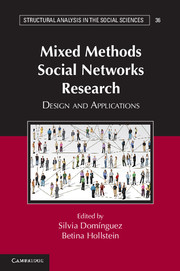Book contents
- Frontmatter
- Dedication
- Contents
- List of Tables
- List of Figures
- Contributors
- Foreword
- Acknowledgments
- Part I General Issues
- 1 Mixed Methods Social Networks Research
- 2 Social Network Research
- 3 Triangulation and Validity of Network Data
- 4 A Network Analytical Four-Level Concept for an Interpretation of Social Interaction in Terms of Structure and Agency
- Part II Mixed Methods Applications
- Part III New Methodological Approaches Used in Mixed Methods Designs
- Index
- References
3 - Triangulation and Validity of Network Data
Published online by Cambridge University Press: 05 July 2014
- Frontmatter
- Dedication
- Contents
- List of Tables
- List of Figures
- Contributors
- Foreword
- Acknowledgments
- Part I General Issues
- 1 Mixed Methods Social Networks Research
- 2 Social Network Research
- 3 Triangulation and Validity of Network Data
- 4 A Network Analytical Four-Level Concept for an Interpretation of Social Interaction in Terms of Structure and Agency
- Part II Mixed Methods Applications
- Part III New Methodological Approaches Used in Mixed Methods Designs
- Index
- References
Summary
Introduction
This chapter deals with the potentials of triangulation of qualitative and quantitative data and methods in network analysis by pursuing two interrelated aims: first, to clarify under which circumstances a triangulation-based research strategy should be pursued and, second, to demonstrate how triangulation can be applied for network data collection and analysis. The relevance of the topic is due to the observation that a narrow focus on either a qualitative or a quantitative research strategy does not capitalize on the full explanatory potential as it systematically excludes certain insights and aspects of the phenomenon under investigation. For certain research questions and phenomena it can be useful and necessary to overcome these limitations (Hesse-Biber 2010). This approach follows the assumption that a method is not wrong or right per se. However, it can be more or less appropriate for specific research aims and settings. Different methodological approaches elaborate on different aspects of reality and are therefore dependent upon the research question (Bryman 2007). Therefore, I will not refer to the fundamental debate between quantitative and qualitative purists (Johnson and Onwuegbuzie 2004). Likewise, I do not discuss the relationship between research methodology, ontology, and epistemology in greater detail. From an ontological point of view, the necessary precondition for applying data triangulation is a very moderate positivistic position that is also in line with the assumptions of Grounded Theory and moderate (social) constructivist approaches (Sale et al. 2002). Triangulation can be used to learn more about an objective reality, but also for investigating the social construction of meaning and perceptions.
- Type
- Chapter
- Information
- Mixed Methods Social Networks ResearchDesign and Applications, pp. 65 - 89Publisher: Cambridge University PressPrint publication year: 2014
References
- 15
- Cited by

